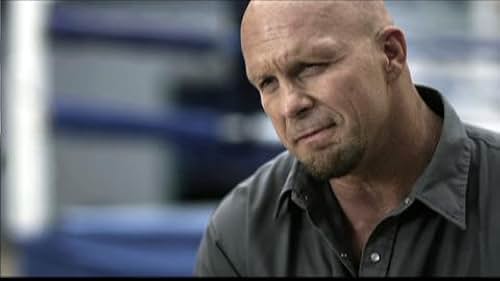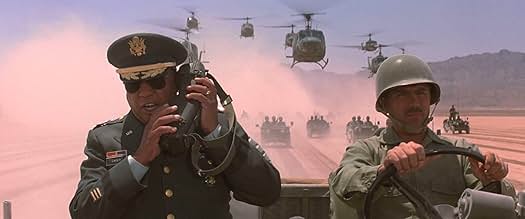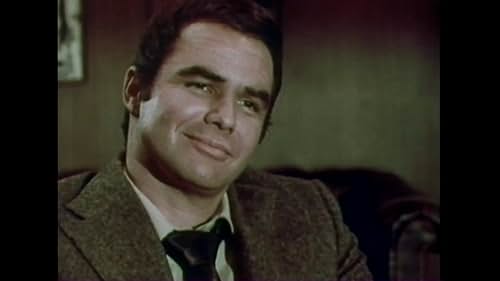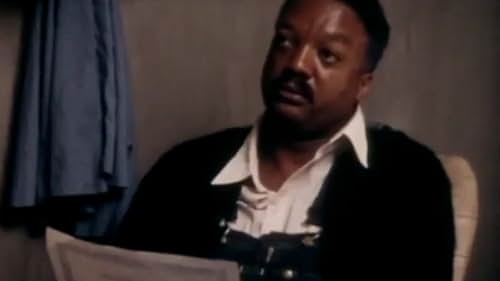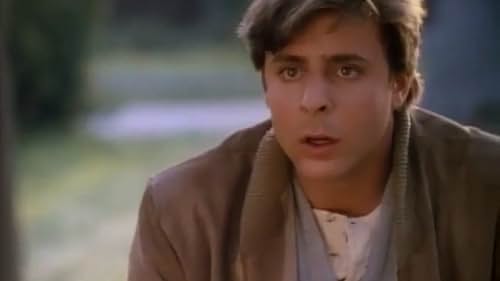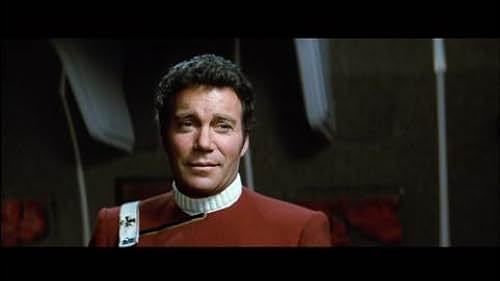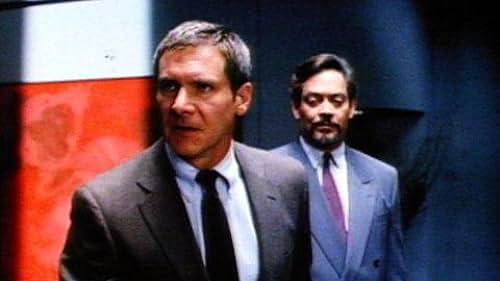Paul Winfield(1939-2004)
- Actor
- Additional Crew
- Soundtrack
Signifying intelligence, eloquence, versatility and quiet intensity,
one of the more important, critically acclaimed black actors to gain a
Hollywood foothold in the 1970s was Paul Winfield. He was born in 1939 in
Dallas, Texas, where he lived in his early years before moving with
his family to Los Angeles' Watts district. He showed early promise as a
student at Manual Arts High School, earning distinction with several
performance awards. As a senior, he earned his first professional
acting job and extended his theatrical education with a two-year
scholarship to the University of Portland in Oregon. Subsequent
scholarships led to his studies at Stanford and Los Angeles City
College, among other colleges. He left U.C.L.A. just six credits short of
his Bachelor's degree.
Paul's first big break came in 1964 when actor/director Burgess Meredith gave him a role in Le Roi Jones' controversial one-act play "The Dutchman and the Toilet". Director Meredith cast him again four years in "The Latent Heterosexual" with Zero Mostel. Although he won a contract at Columbia Pictures in 1966 and built up his on-camera career with a succession of television credits, he continued to focus on the legitimate stage. A member of the Stanford Repertory Theatre, he concentrated on both classic and contemporary plays. In 1969, Paul joined the Inner City Cultural Center Theatre in Los Angeles for two years, which offered a drama program for high school students.
In the late 1960s, Paul redirected himself back to performing on television and in films with guest work in more than 40 series on the small screen, including a boyfriend role on the first season of the landmark black sitcom Julia (1968) starring Diahann Carroll. In films, he was given a featured role in the Sidney Poitier film The Lost Man (1969), and earned comparable roles in R.P.M. (1970) and Brother John (1971) before major stardom occurred.
1972 proved to be a banner year for Paul after winning the male lead opposite Cicely Tyson in the touching classic film Sounder (1972). His towering performance as a sharecropper who is imprisoned and tortured for stealing a ham for his impoverished family earned him an Oscar nomination for "Best Actor" -- the third black actor (Sidney Poitier and James Earl Jones preceded him) to receive such an honor at the time.
From there a host of films and quality television roles began arriving on his doorstep. In mini-movies, Paul portrayed various historical/entertainment giants including Thurgood Marshall, Don King and baseball's Roy Campanella, and was Emmy-nominated for his portrayal of Martin Luther King, Jr. in King (1978) with Sounder co-star Cicely Tyson as wife Coretta. Throughout the 1970s and 1980s, he earned solid distinction in such prestige projects as Backstairs at the White House (1979), Roots: The Next Generations (1979) (another Emmy nomination), The Sophisticated Gents (1981), The Blue and the Gray (1982), Sister, Sister (1982), James Baldwin's Go Tell It on the Mountain (1985), Under Siege (1986) and The Women of Brewster Place (1989).
Although the big screen did not offer the same consistent quality following his breakthrough with Sounder, he nevertheless turned in strong roles in Conrack (1974), Huckleberry Finn (1974), A Hero Ain't Nothin' But a Sandwich (1977) (again with Ms. Tyson), Damnation Alley (1977), Star Trek II: The Wrath of Khan (1982) and White Dog (1982).
Surprisingly, Paul never achieved the promise of a Sidney Poitier-like stardom and his roles diminished in size. Relegated to character roles, he still appeared in such quality television as Breathing Lessons (1994), although he was not the major focus. After two nominations, he finally won the Emmy for a guest performance as a judge on Picket Fences (1992). Paul's showier work at this period of time included the film Catfish in Black Bean Sauce (1999) and a surprise cross-dressing cameo as Aunt Matilda in Relax... It's Just Sex (1998).
On stage, Paul graced such productions as "Richard III" (at New York's Lincoln Center Theatre), "Othello", "The Merry Wives of Windsor", "The Seagull", "A Few Good Men", "Happy Endings" and "Checkmates", which became his sole Broadway credit. Paul also served as Artist in Residence at the University of Hawaii and subsequently at the University of California at Santa Barbara.
In his final years, Winfield narrated the A&E crime series City Confidential (1998), appeared as a teacher in a television adaptation of his earlier success Sounder (2003), and enjoyed a recurring role as Sam for many years on the series Touched by an Angel (1994).
Suffering from obesity and diabetes in later life, Paul Winfield passed away from a heart attack at age 64 in 2004, and was survived by a sister, Patricia. His longtime companion of 30 years, set designer and architect Charles Gillan Jr. predeceased him by two years.
Paul's first big break came in 1964 when actor/director Burgess Meredith gave him a role in Le Roi Jones' controversial one-act play "The Dutchman and the Toilet". Director Meredith cast him again four years in "The Latent Heterosexual" with Zero Mostel. Although he won a contract at Columbia Pictures in 1966 and built up his on-camera career with a succession of television credits, he continued to focus on the legitimate stage. A member of the Stanford Repertory Theatre, he concentrated on both classic and contemporary plays. In 1969, Paul joined the Inner City Cultural Center Theatre in Los Angeles for two years, which offered a drama program for high school students.
In the late 1960s, Paul redirected himself back to performing on television and in films with guest work in more than 40 series on the small screen, including a boyfriend role on the first season of the landmark black sitcom Julia (1968) starring Diahann Carroll. In films, he was given a featured role in the Sidney Poitier film The Lost Man (1969), and earned comparable roles in R.P.M. (1970) and Brother John (1971) before major stardom occurred.
1972 proved to be a banner year for Paul after winning the male lead opposite Cicely Tyson in the touching classic film Sounder (1972). His towering performance as a sharecropper who is imprisoned and tortured for stealing a ham for his impoverished family earned him an Oscar nomination for "Best Actor" -- the third black actor (Sidney Poitier and James Earl Jones preceded him) to receive such an honor at the time.
From there a host of films and quality television roles began arriving on his doorstep. In mini-movies, Paul portrayed various historical/entertainment giants including Thurgood Marshall, Don King and baseball's Roy Campanella, and was Emmy-nominated for his portrayal of Martin Luther King, Jr. in King (1978) with Sounder co-star Cicely Tyson as wife Coretta. Throughout the 1970s and 1980s, he earned solid distinction in such prestige projects as Backstairs at the White House (1979), Roots: The Next Generations (1979) (another Emmy nomination), The Sophisticated Gents (1981), The Blue and the Gray (1982), Sister, Sister (1982), James Baldwin's Go Tell It on the Mountain (1985), Under Siege (1986) and The Women of Brewster Place (1989).
Although the big screen did not offer the same consistent quality following his breakthrough with Sounder, he nevertheless turned in strong roles in Conrack (1974), Huckleberry Finn (1974), A Hero Ain't Nothin' But a Sandwich (1977) (again with Ms. Tyson), Damnation Alley (1977), Star Trek II: The Wrath of Khan (1982) and White Dog (1982).
Surprisingly, Paul never achieved the promise of a Sidney Poitier-like stardom and his roles diminished in size. Relegated to character roles, he still appeared in such quality television as Breathing Lessons (1994), although he was not the major focus. After two nominations, he finally won the Emmy for a guest performance as a judge on Picket Fences (1992). Paul's showier work at this period of time included the film Catfish in Black Bean Sauce (1999) and a surprise cross-dressing cameo as Aunt Matilda in Relax... It's Just Sex (1998).
On stage, Paul graced such productions as "Richard III" (at New York's Lincoln Center Theatre), "Othello", "The Merry Wives of Windsor", "The Seagull", "A Few Good Men", "Happy Endings" and "Checkmates", which became his sole Broadway credit. Paul also served as Artist in Residence at the University of Hawaii and subsequently at the University of California at Santa Barbara.
In his final years, Winfield narrated the A&E crime series City Confidential (1998), appeared as a teacher in a television adaptation of his earlier success Sounder (2003), and enjoyed a recurring role as Sam for many years on the series Touched by an Angel (1994).
Suffering from obesity and diabetes in later life, Paul Winfield passed away from a heart attack at age 64 in 2004, and was survived by a sister, Patricia. His longtime companion of 30 years, set designer and architect Charles Gillan Jr. predeceased him by two years.

